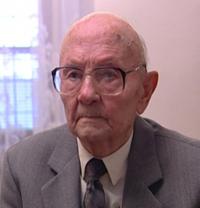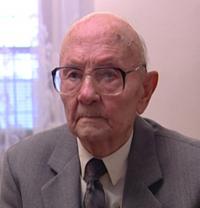Joining was my blessing in disguise

Stáhnout obrázek
Imrich Gallik was born on August 16, 1926, in Spišská Belá part Strážky into Spiš-German peasant family. His father fought in an Austrian-Hungarian army in Russia. His mother came from a German family, who after the emigration to the USA returned to Slovakia in 1904. Imrich‘s mother tongue was German, he attended a German school and under the regulations then, he also belonged to Hitlerjugend. He got trained in joinery and from 1944 he worked in a joiner‘s workroom and at the same time he helped his father feed horses in gamekeeper‘s lodge. Immediately after the liberation, national militia in close cooperation with the Soviet command took over the security service in the state. The security authorities of NKVD with an assistance from their informers started arresting local people. The first were Slovaks, mainly those who worked as clerks, teachers, policemen, officers and members of HSĽS (Hlinka‘s Slovak People‘s Party), HG (Hlinka Guard) as well as the citizens of German and Hungarian nationality. It was often a random selection - just to fill up the transports and gain cheap labour force. When Imrich Gallik was at work in Kežmarok gamekeeper‘s lodge on March 10, 1945, the three NKVD agents and a member of people‘s militias came and led him away. As he was a citizen of German nationality he also was a member of militia, thus he had to obey. After five days of interrogation in Spišská Belá, he was guarded on foot to Levoča along with other arrested men. He spent three days in a concrete dungeon without any light and food. He had been there for two weeks, when he was transferred to Nowy Sacz in Poland and thence to Sanok, where he also spent several weeks. This transit camp was only the first station as then they continued the way in freight cars, in which they spent 9 days in really inhuman conditions. Three months later they arrived in the Soviet labour camp of Alagir and thence they went on foot to the labour camp in Nuzal, which was about 35 kilometres away. After division of prisoners into groups, Imrich Gallik was due to his joinery skills assigned to work at the building of another labour camp in Zgit, where prisoners built wooden shacks, instead of working in a mine. Imrich spent three and a half years in gulag. After being released from prison, he was transported to German town of Frankfurt (Frankfurt an der Oder), and he didn‘t have permission to return to Slovakia. Thus he decided to cross the Czech borders illegally and he came back home to Strážky on December 20, 1948. After his return, he engaged in joinery again and in 1951 got married. However, in connection with the communist takeover his family experienced not only confiscation of assets, but also nationalisation of over 6 ha of their land and for their negative attitude to joining the agricultural cooperative his mother never got the food rations. Imrich Gallik enjoyed the following years with his closest relatives in his native village and the years he had spent in gulag remained just a painful memory for him.

